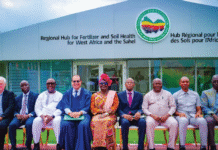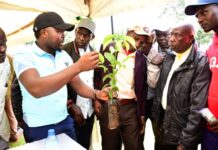The world is marking the World Hunger Day on May 28 and the evidence is clearer than ever – maintaining on-farm productivity globally is critical to global food security. A profound transformation of the global food and agriculture system is needed, and swift action needs to be taken to provide food and humanitarian relief to the most at-risk regions.
Agriculture puts food on our tables and is a pivotal industry for Africa and Middle East accounting for approximately 30% – 40% of GDP in most countries in the region. From time immemorial, Africa has been the epicenter of acute food shortage mainly due to civil conflicts and wars, pests and diseases, effects of climate change and the impact of COVID-19. The Russia and Ukraine war for example has resulted in uncertainty thereby triggering some policy implementation to limit exports of crop inputs and commodities, putting food security at risk. We have seen, and will continue to see, the prices of agricultural commodities rise. Particularly hard hit by acute food insecurity is the continent of Africa where it’s estimated that in 2021, 523,000 people in Ethiopia, South Sudan, and southern Madagascar alone experienced a catastrophic famine, which resulted to death and starvation.
On top of it all, the European Union Green Deal, if implemented arbitrarily, will rule out the use of certain technologies like pesticides and gene editing – the kinds of innovations that will drive sustainable agriculture. Limiting farmers’ access to safe and effective plant science innovations will have a severe impact on millions of farmers who rely on these solutions to support their livelihoods and will be detrimental for some of the world’s most vulnerable people. For the region’s farmers to improve their yields and to provide society with healthy food, we need healthy plants. Plant science helps protect crops, allowing farmers to protect their yield, and consumers to continue to access and enjoy food that is pest-free and disease-free.
African and Middle Eastern countries are particularly susceptible to trickle down effects from the EU’s Farm to Fork strategy, pushing food security and zero hunger (SDG 2) further from the realm of possibility. It is increasingly clear that technologies and practices that support agricultural resilience are key to protecting food security and human health for generations to come. The World Hunger Day is a golden opportunity for all stakeholders in the food sector to take stock of the successes and failures – by governments, the private sector, nonprofit organizations, researchers – in ensuring global food security in the Africa Middle East region.
While our industry may not have all the answers to these challenges, we continue to work towards solutions. The plant science industry recognises the important role it plays to meet the SDGs and is responding to this task by:
- Developing training partnerships across the agricultural value chain to ensure smallholder farmers can grow healthy crops sustainably. Partners include governments, development organisations, foundations, and food distributors, with millions of farmers trained to date.
- Promoting innovative crop protection products that effectively help farmers fight pests such as Fall Armyworm, which has ravaged sub-Saharan African maize crops, and exploring new solutions in biotechnology to aid farmers in adapting to changing weather patterns with drought-tolerant seeds. Both these technologies facilitate the production of safe and nutritious food, while safeguarding the environment.
- Advocating for responsible farm management, consumption, and production to reduce carbon footprints.
- Training in sustainable use and effective management of pesticides. Since 2005, our network has been working to collect, safely dispose of and recycle plastic pesticide containers, while innovations in crop protection and biotechnology have helped farmers reduce their greenhouse gas emissions.
Call to Action
For Africa and Middle East regions to fully, or partially, achieve food sustainability, they will have to confront an array of bottlenecks that have for years impeded the attainment of food security. In recognition of World Hunger Day on May 28, we call for all stakeholders across Africa Middle East to urgently to do everything in their power to strengthen their commitment to work together and find new ways to transform agri-food systems. This day is a golden opportunity to remind the world to come up with practical solutions to achieve Zero hunger by 2030 as envisaged in the 2030 Agenda for Sustainable Development and the Paris Climate Agreement. These are just some of the actions that are needed to accelerate progress in the region on food security:
- Promote sound agricultural policies and on-the-ground investment in research and innovation.
- Support open, fair, and resilient global trade, including the African Continental Free Trade Area (AfCFTA) Agreement in Africa’s agricultural sector as this remains key to supporting international markets and keeping supply chains moving; a sentiment that has been shared by G7 agriculture ministers and Food and Agriculture Organisation.
- Collaborate with leading technology providers to create powerful solutions for customers, increase high quality food production, and poverty reduction
- Create a conducive regulatory environment that enables the deployment and adoption of innovations
- Improve trade policy to better enable the free flow of food from where it can best be produced to where it is most needed.
- Improve linkages along the food and agriculture value chain and outside of the agriculture industry for new kinds of collaborations and innovation – from mobile to marketing to micro-financing.
Improve policies to enhance access to necessary seed and plant science technologies. - Increase regional integration and invest substantially in l infrastructure, agricultural research, new technologies (both biotechnology and mechanical) and extension services.
More resources will be needed to alleviate hunger in Africa because the number of people in need of food, especially in the continent of Africa, has been increasing since 2014.There is some hope for the region to achieve a better and more sustainable future for us all. This can only happen if all players – industry, governments, donors, civil society, and NGOs – work together and implement interventions to build resilient food systems.
###
Article written by Dr. Samira Amellal – Directeur General. CropLife AME.









